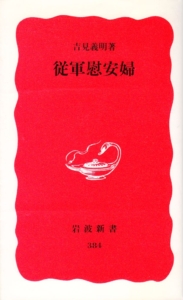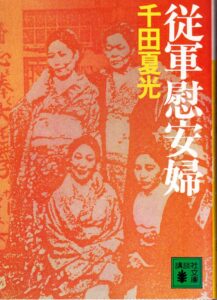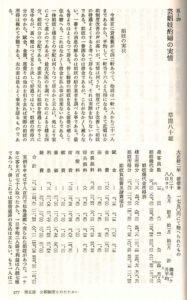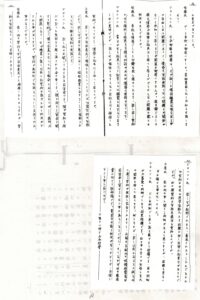With regard to the question “Were the Comfort Stations Established Because of a Demand Made by the Occupation Forces?” in part 0-8 of this Q&A, it is described on Japanese Wikipedia that “Citing examples like that of Recreation and Amusement Association operated by the U.S. military in Japan etc., Ikeda Nobuo argues that national prostitution facilities have been established the world over…” and Ikeda Nobuo’s blog is cited to form the basis of this description.
(The links to Wikipedia: http://ja.wikipedia.org/wiki/%E5%90%89%E8%A6%8B%E7%BE%A9%E6%98%8E#cite_note-8 and to Ikeda Nobuo’s blog:
http://ikedanobuo.livedoor.biz/archives/51860114.html Both were accessed on July 30th, 2013.)
First, with regard to the posting on Wikipedia, as explained in “Were the Comfort Stations Established Because of a Demand Made by the Occupation Forces?” in part 0-8 of this Q&A, it is clear that the description “the Recreation and Amusement Association was operated by the U.S. military” is false. How can they claim that it was “operated by the U.S. military?” Show us the evidence.
And as for the claim that “state-run prostitution facilities have been established the world over,” we want to see evidence that they are “operated” by each country. Even Hata Ikuhiko couldn’t tell such a shameless lie.
Ikeda Nobuo’s weblog is cited to form the basis of the above description in Wikipedia. However, comparing both descriptions, it provides nothing of the sort. It may simply be because of a lack of ability to read and understand Japanese. Just to make sure, let’s examine Ikeda Nobuo’s weblog.
Ikeda describes as false the remarks Yoshimi Yoshiaki made a news conference at Osaka City Hall on June 4, 2013. The quote reads, “No other country systematically established comfort stations as military facilities. Japan’s adoption of the comfort women system was unique” First, it is important to remember that Ikeda is quoting from story put out by Kyodo News. Clearly such a report doesn’t convey the whole picture of a news conference, but is summarized by attending reporters. Even an interview that goes on for dozens of minutes is often shown on TV for only a few seconds. It is normal for only the part of the conversation they deem important to be selected and televised.
Let’s examine what Yoshimi himself has written up until now. In Comfort Women Columbia University Press (2002), he refers to the militaries of various countries and introduces the reader to the comfort stations of the German military and the Schutzstaffel (pp 202 and following). In What Was the Japanese Military “Comfort Women” System? (Iwanami Booklet, 2010), he describes that “Only the Japanese and German military are confirmed to have taken the initiative in establishing, maintaining and managing such a system.” (Page 53)
Also, featured in a June 6, 2013 publication of the Center for Research and Documentation on Japan’s War Responsibility (which Yoshimi co-leads) is the “Statement on the Issue of the Japanese Military ‘Comfort Women’”. It reads as follows:
Some people insist that there have been systems similar to that of the Japanese military’s “comfort women” in all the countries of the world, but they’ve never presented the data on which they base their arguments. According to research up until now, only Japan and Nazi Germany are known to have adopted national and systematic sexual slavery like the Japanese military “comfort women” system at the time of World War II. In many countries at that time, a licensed prostitution system didn’t exist from the very beginning (the U.S. is one example) or was abolished (as in the U.K.), and even if soldiers used private brothels, militaries weren’t allowed to systematically establish and operate them. Sexual violence by foreign military personnel is different from the comfort women system, and responsibility arising from the Japanese military comfort women system can’t be denied by mixing them up. Only after Japan sincerely accepts and acknowledges the fact of this system, as well as its many other serious sex crimes, and only after it apologizes and makes personal compensation, only then may it raise the issue of what may have gone on in other countries. http://space.geocities.jp/japanwarres/ (Japanese only)
As we see, Yoshimi does cite the instances of Germany and other countries in his work. Ikeda denounces him as a “forger” or “liar” by intentionally referring only to one brief story that came out of a news conference.
Ikeda claims that the prostitution in Germany was “state-operated”, but on what is he basing this assertion? He also says that, “as distinct from the comfort women system in Japan, Germany’s use of coercion made it a state crime.” If this is the case, he should provide the material forming the basis of his argument that the systems were different. It may be true that women in Germany, as in Japan, were forced to become comfort women, but it is unfair to criticize other countries without providing the material that forms the basis of the criticism. (For reference please see Hata Ikuhiko, Ianfu to senjo no sei [“Comfort Women and Sex in War”] Publ: Shinchosha, 1999. Only a brief summary of a book written by Seidler is given and the data which forms the basis of his argument isn’t provided.)
And let’s examine the work by Hata Ikuhiko that Ikeda cites. Ikuhiko writes, “if we really must compare them, the German military controlled the system with orders on the highest level, while in the case of the Japanese military it took place locally, on a very low level. If you exclude things related to transport, it seems they were entrusted mainly with unofficial negotiations on the business side, and it seems the system was operated quite carelessly.” (p. 151) However it was clearly anything but a “very low level” agency, judging from the fact that “recreation facilities” were listed as being among “official military facilities” when the “Regulations for Field Post Exchange” were revised by the Minister of War in September 1937, and in many other documents produced by Ministries such as those of War, Foreign Affairs, Home Affairs, etc. (Please refer to the reference data section of this website for these documents, presently only in Japanese.)
Moreover, Ikeda tries to conceal this fact by saying that “In any case, it doesn’t matter whether there were official or not.” Let us follow his argument. So if the Minister of Defense orders the Self-Defense Force to establish comfort stations and to round-up pimps to enlist women by means of fraud or through human trafficking, and establishes these stations (constructed by the Civil Engineering Squadron of the Self-Defense Force) near the Self-Defense Force Camps, and if the Self-Defense Force enacts regulations to control the comfort stations, not allowing women to go out, and determining what days of the week personnel may use comfort stations, if all of this is true, then “it doesn’t matter.” Not only does it not matter, it is the same as personnel going to the red-light district on their days off. Is this really the intellectual level we have sunk to in Japan, that such arguments are shamelessly made on the internet?






